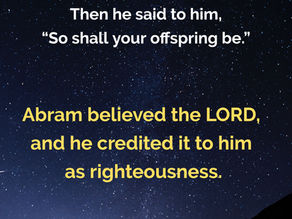Psalm 85 - Where Wrath & Restoration Meet
- Chad Werkhoven
- May 2, 2025
- 5 min read
Repentance begins by understanding God's wrath has kissed His peace.
Psalm 85
For the director of music. Of the Sons of Korah. A psalm.
1 You, Lord, showed favor to your land;
you restored the fortunes of Jacob.
2 You forgave the iniquity of your people
and covered all their sins.
3 You set aside all your wrath
and turned from your fierce anger.
4 Restore us again, God our Savior,
and put away your displeasure toward us.
5 Will you be angry with us forever?
Will you prolong your anger through all generations?
6 Will you not revive us again,
that your people may rejoice in you?
7 Show us your unfailing love, Lord,
and grant us your salvation.
8 I will listen to what God the Lord says;
he promises peace (šā·lôm) to his people, his faithful servants—
but let them not turn to folly.
9 Surely his salvation is near those who fear him,
that his glory may dwell in our land.
10 Love (ḥěʹ·sěḏ) and faithfulness meet together;
righteousness and peace kiss each other.
11 Faithfulness springs forth from the earth,
and righteousness looks down from heaven.
12 The Lord will indeed give what is good,
and our land will yield its harvest.
13 Righteousness goes before him
and prepares the way for his steps.
Canons of Dordt
Point 2 - Limited Atonement
Article 1: God’s Right to Condemn All People
Romans 5:12-14 - Mis-Markmanship
Deuteronomy 28:15-20 - Not A Tame Lion
Luke 15:11-16 - Prodigious Deprivation
Psalm 143 - Aggressive Prayer Pattern
Article 2: The Manifestation of God’s Love
Zephaniah 3:14-17 - The Mighty Warrior Who Saves
Lamentations 3:19-23 - Great Is Thy Faithfulness
Article 3: The Preaching of the Gospel
1 Timothy 2:1-7 - God Our Savior
Rom 10:14-17 - The Power of Preaching
1 Cor 1.23-24 - God's Foolishness
Psalm 93 - Mightier Than Chaos
Article 4: A Twofold Response to the Gospel
John 6:37-40 - Tensegral Theology
John 12:42-50 - Buffet Theology
Article 5: The Sources of Unbelief and of Faith
James 1:13-18 - The Devil (didn't) Make You Do It
Ecclesiastes 7:25-29 - Many Schemes
Ephesians 2:8 - The Gift of God
Psalm 95 - The LORD is OUR God
Article 6: God’s Eternal Decree
Ezekiel 36:24-27 - A Whole New Reality
Romans 9:15-21 - God's Mercy, Not Your Effort
2 Thessalonians 2:10-12 - Love The Truth
Article 7: Election
Ephesians 1:3-6 - Before the Foundation
Deuteronomy 7:1-10 - Set Apart
John 17:1-5 - Sovereign Submission
Psalm 115 - God Does What He Pleases
Article 8: A Single Decree of Election
Romans 4:1-8 - One and the Same
Romans 4:9-17 - Chicken or Egg?
Romans 4:18-25 - Faithfully Face the Facts
Hebrews 11:39-40 - Promises Kept
Psalm 33 - God's Control, Authority & Presence
Article 9: Election Not Based on Foreseen Faith
2 Timothy 1:7-10 - Passive & Powered
Deuteronomy 9:4-6 - You're Not That Awesome
Psalm 91 - The Shelter of the Most High
Article 10: Election Based on God’s Good Pleasure
Luke 2:13-14 - Christmas in March
Galatians 4:1-7 - From Slave to Son
1 Peter 2:9-10 - You're The Best Thing God Has!
Article 11: God’s election is unalterable.
Malachi 3:6-7 - Keep It Simple
Hebrews 6:13-20 - Unchanging Anchor
Hebrews 13:1-8 - Keep On Loving
Hebrews 6:13-20 - Unchangeable Blessing
Article 12: The Assurance of election
Hebrews 11:1-6 - Confident Assurance
Malachi 3:14-18 - Childlike Fear
2 Corinthians 7:8-11 - Godly Sorrow
Psalm 65 - The Hearer of Prayers
Article 13/14: The Fruit of our assurance
Isaiah 57:14-21 - God's Second Residence
2 Peter 1:3-10 - Make Every Effort
Isaiah 42:1-9 - The Sovereign & His Servant
Article 1: The Punishment Which God’s Justice Requires
God is not only
supremely merciful,
but also supremely just.
This justice requires
(as God has revealed in the Word)
that the sins we have committed against his infinite majesty
be punished with both temporal and eternal punishments,
of soul as well as body.
We cannot escape these punishments unless satisfaction is given to God’s justice.
Summary
Psalm 85 poetically presents the process of repentance. Notice where repentance so often begins - conventional wisdom places its first steps in realizing the wrongness of your actions. Although such a realization is an important step, the psalmist in v1-3 places the first step of repentance in being reminded (or told the first time) of God's simultaneously righteous and gracious nature. The LORD showed favor, He restored the fortunes and forgave iniquity and covered sins. He set aside wrath (other translations: hot/burning/raging anger) and turned from His fierce anger.
It makes sense that repentance must begin with this theological understanding of who God is. Why else would one repent if there was no fear of punishment? Why would one repent if there was no possibility of the resulting hot/burning/raging anger and wrath being set aside?
The superscriptions that precede many Psalms are different than the headings that appear before other passages in the Bible. Those headings have been added by the publisher as a handy convenience to help us locate and summarize passages. But the superscriptions in the psalms are an ancient indication of not only who wrote the psalm, but what the psalm was written for.
There are 55 psalms (roughly 1/3) designated for the director of music. Among other things, it meant the psalm was a key part of ancient Hebrew liturgy - it was meant to be sung by all the people. Notice here that God wanted His people singing of His wrath! But not just singing about its hot/burning/raging nature, but about how God sets it aside in order to show favor, restore and forgive the sins which He has covered.
Dig Deeper
After completing this critical first step of coming to understand God's righteous / gracious nature, Psalm 85 walks us through the remaining aspects of repentance:
Asking God our Savior to restore (v4) and revive (v6) us;
Promising to listen to what God the LORD says;
Being certain that His salvation is near those who fear Him, and that somehow God doesn't compromise His holy nature as He forgives our sin. God's covenant requirements (ḥěʹ·sěḏ) are met by His faithfulness, and His righteousness [holy justice] and peace kiss each other. To the psalmist, this must have seemed impossible. Of course we know that God accomplished this through Christ!
An assurance that upon our repentance, that the LORD will indeed give what is good.
ACKNOWLEDGE WHO GOD IS: Our Father, God our Savior in whom love and truth are met together (KJV);
ALIGN YOUR LIFE WITH GOD'S WILL: Pray that as you prepare for Lord's Day worship that your church's music and liturgy will remind you that God has set aside His wrath and calls you to repent before Him;
ASK GOD FOR WHAT YOU NEED:
Read the New Testament in a year! Today: Matthew 20




















Comments